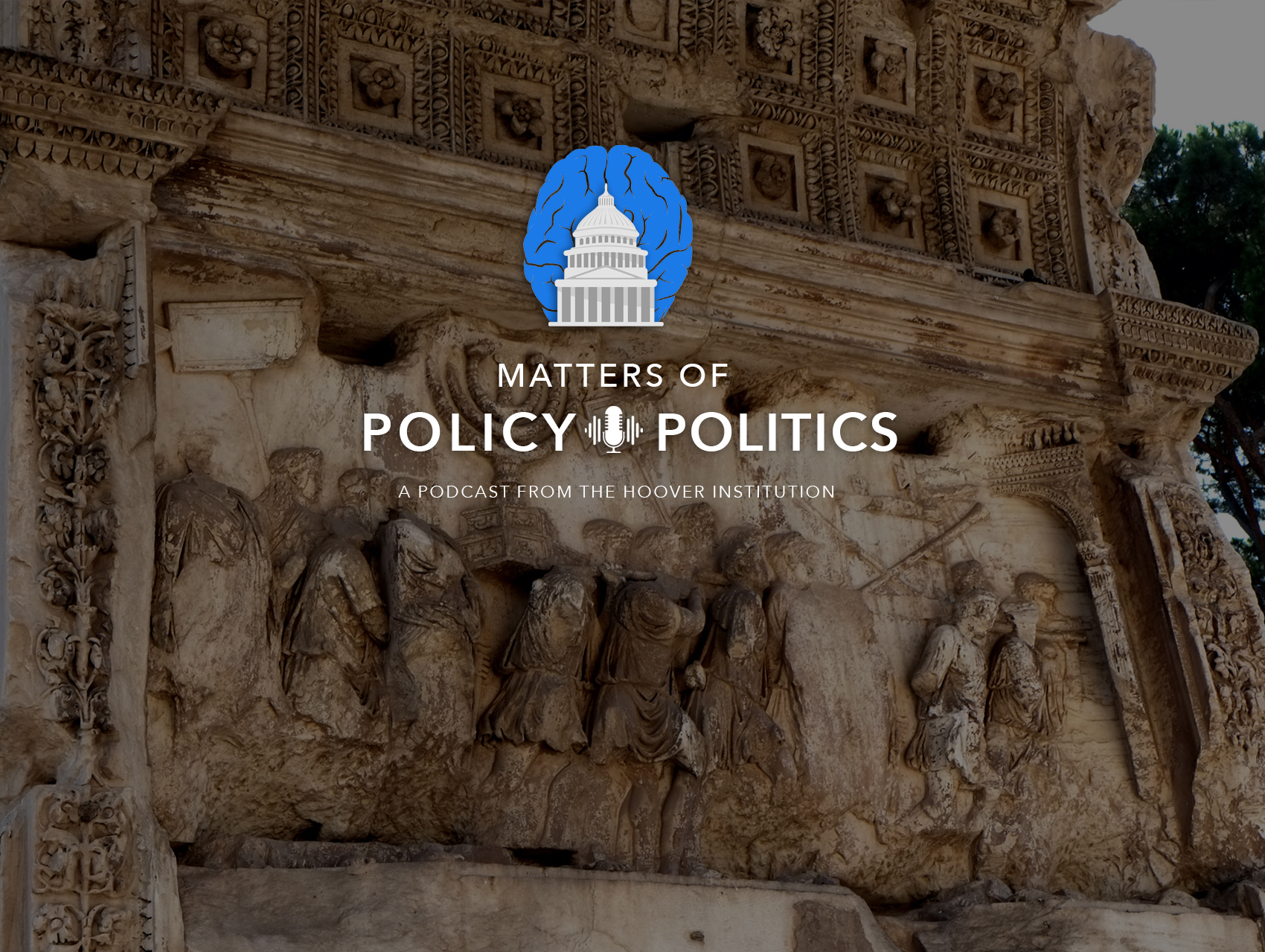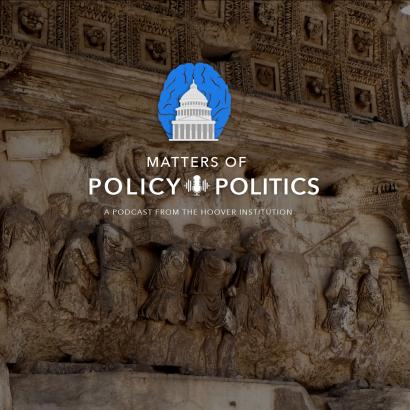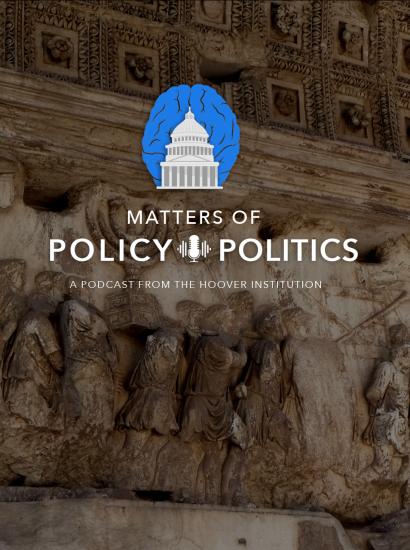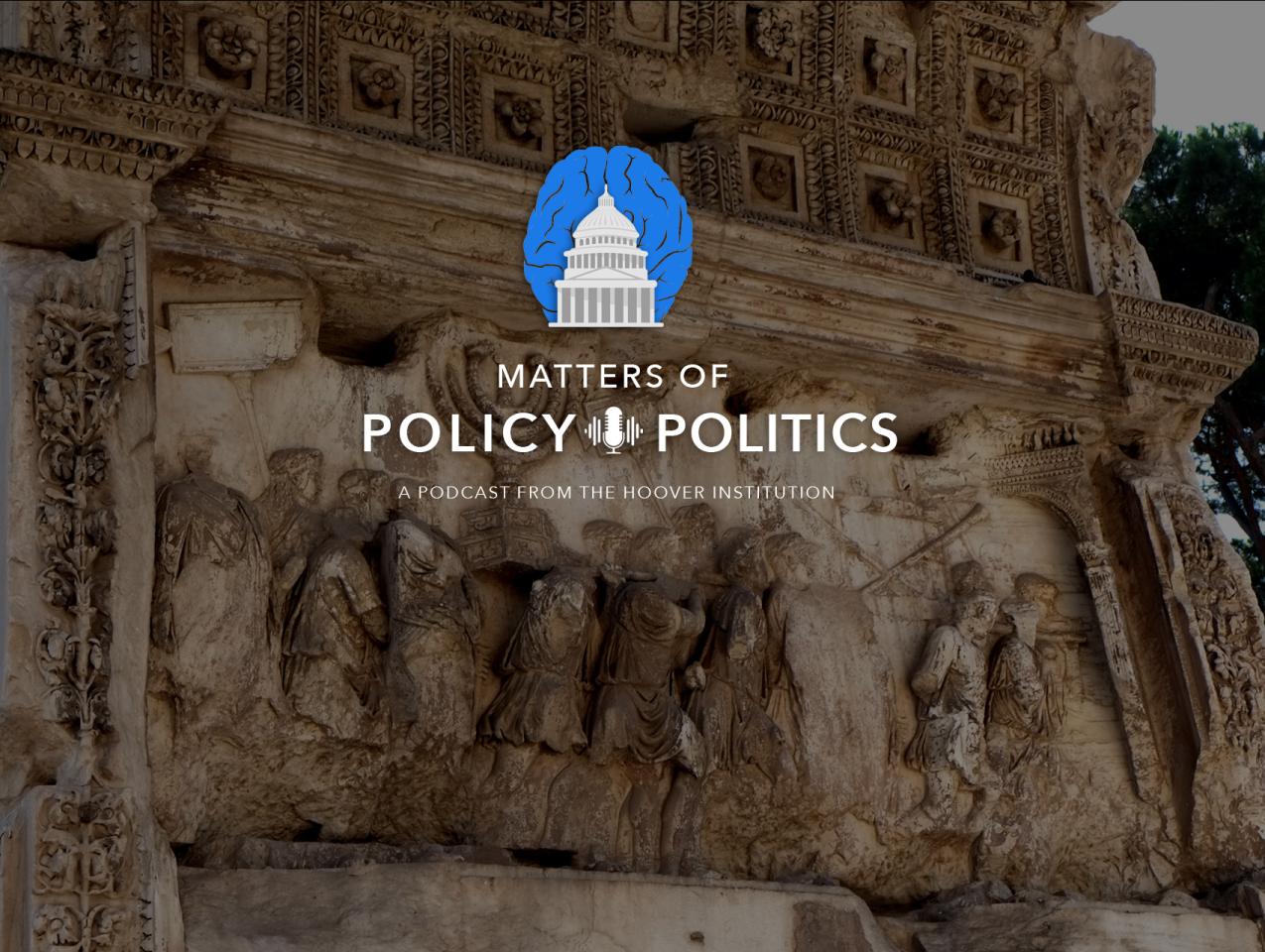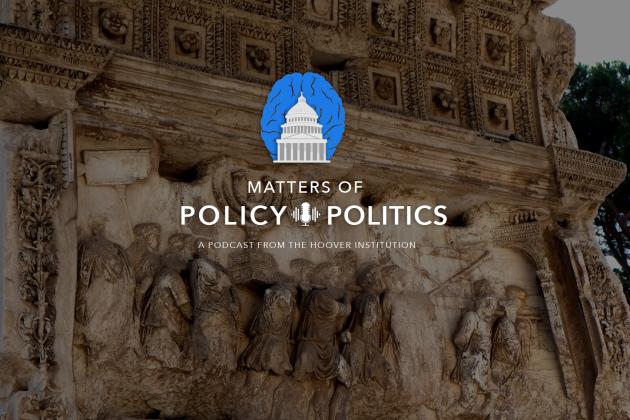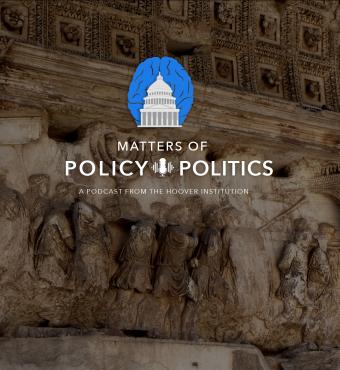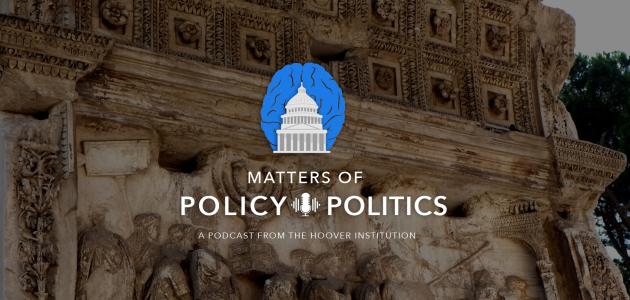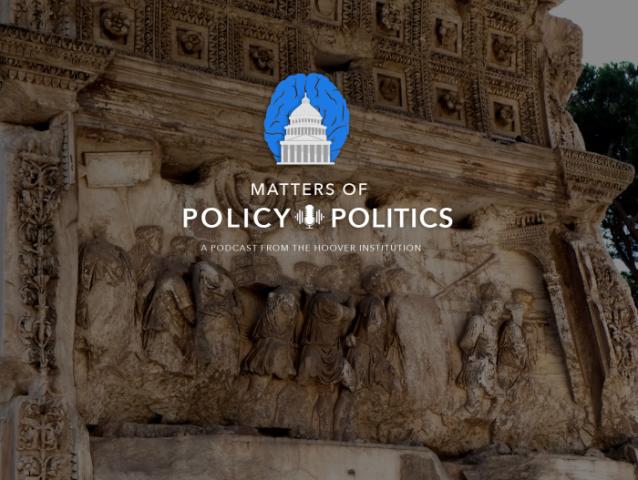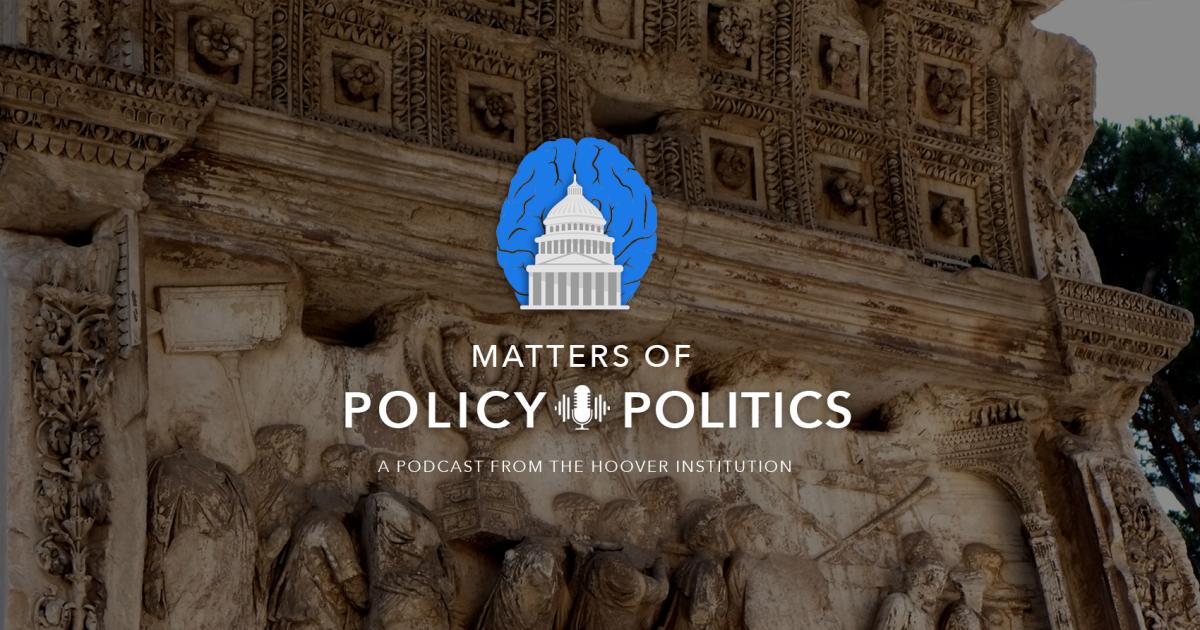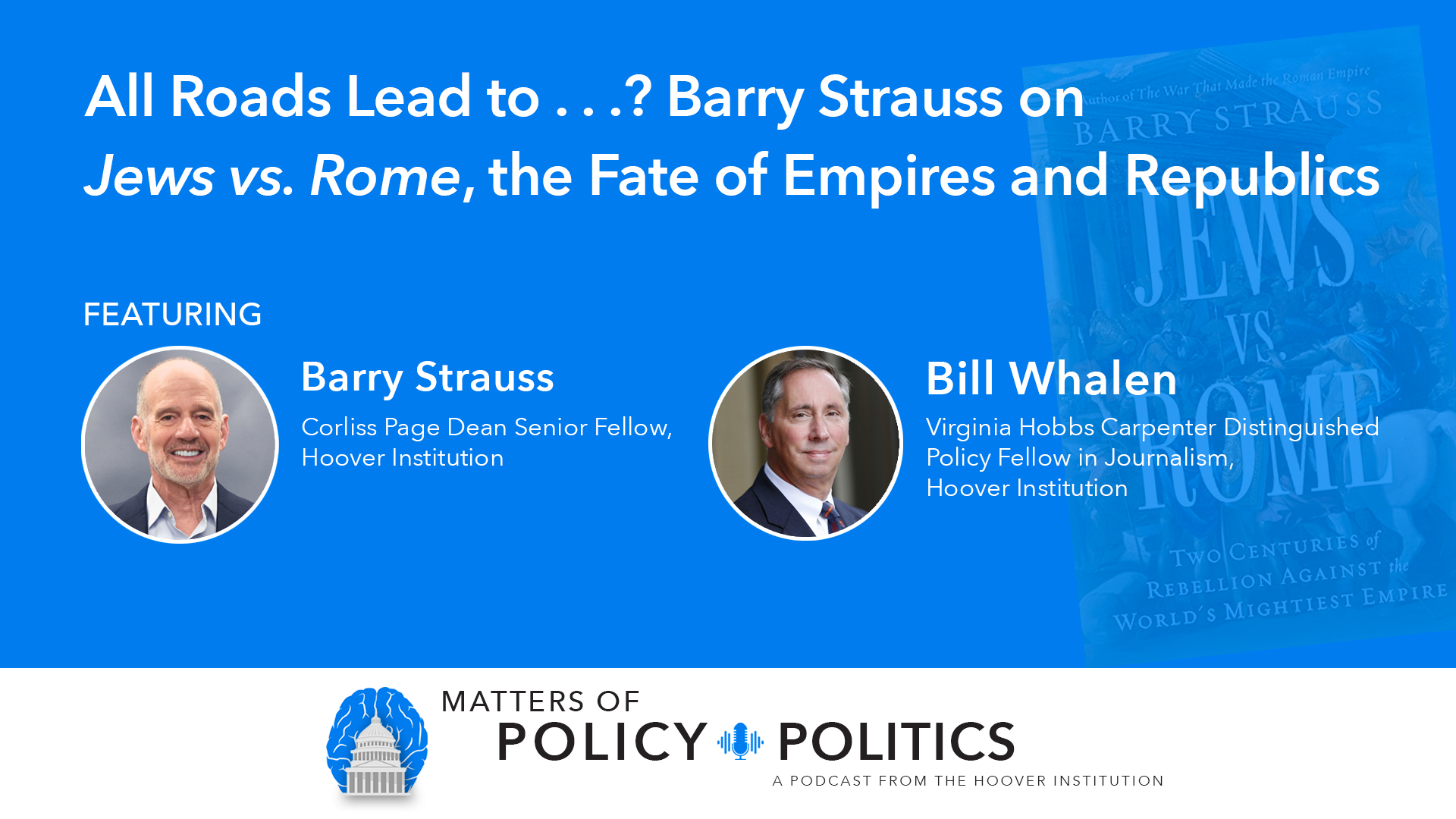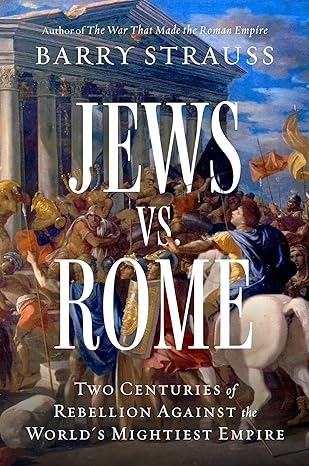- History
- Revitalizing History
Three times in ancient history, the Jewish people revolted against the Roman Empire – the end result being genocide, enslavement, exile, and religious oppression. Barry Strauss, the Hoover Institution’s Corliss Page Dean senior fellow and author of the newly released book Jews Vs. Rome: Two Centuries of Rebellion Against the World’s Mightiest People, discusses what triggered the various uprisings (taxation, free will) and the lessons they offer in current world politics – specifically, how Israel’s friends and foes view the Jewish state. Also discussed: how the American and Roman empires/republics are similar yet different and, on a lighter note, why the entertainment world insists upon an ancient Rome full of mild British accents and good dental hygiene.
>> Bill Whalen: It's Friday, August 15, 2025, and welcome back to Matters of Policy and Politics, a Hoover Institution podcast. I'm Bill Whalen. I'm the Virginia Hobbs Carpenter Distinguished Policy Fellow in Journalism here at the Hoover Institution, but I am one of several fellows who are podcasting. I recommend you go to our website, which is hoover.org podcast, and check out what we offer to you.
We cover the waterfront of issues. It's great stuff. If you like to listen to pods when you work out or travel or drive in your car, whatever, you definitely check out the Hoover podcast. Today we're going to do something a little different. We're going to go back in time and then back to the present to talk about some elements that they have in common.
This would be talk about empires, the health of republics, and the condition of the Jewish people. And joining me today to talk about this is Barry Strauss. Barry is the Hoover Institution's Corliss Page Dean Senior Fellow, as well as the Bryson Edith M. Boehmer professor of Humanistic Studies Emeritus at Cornell University.
He's also a military naval historian with a focus on ancient Greece and Rome and their lessons. For Barry Strauss is a winner of the 2025 Bradley Prize in honor of his dedication to the study and teaching of Western civilization and classical military history. That passion is evident if you read his latest book, which is hot off the presses.
It's titled Jews vs Rome, Two Centuries of Rebellion against the World's Mightiest People. Barry, thanks for coming on the podcast.
>> Barry Strauss: Thank you, Bill. Pleasure to be here.
>> Bill Whalen: So, since I referenced your Cornell roots, let me now get you in trouble with your friends back in Ithaca, be honest.
It's about 75 degrees outside here in Northern California today not a cloud in the sky. Tell me this is a better place to live than Ithaca.
>> Barry Strauss: Yeah, the weather is a bit of an upgrade here. I love Ithaca. It's very beautiful, but the weather. California wins in the weather department.
Without question.
>> Bill Whalen: Okay, now make the case for Ithaca. What's better about upper state New York than Northern California?
>> Barry Strauss: Living is easy. No traffic, daily life absolutely hassle free living. And, and I have a lot of friends there, so.
>> Bill Whalen: Okay, let's. Let's talk a couple minutes about what brought you into this profession, Barry.
Why the attraction to history? Why the attraction to ancient history, military history, naval history?
>> Barry Strauss: Golly. I felt that history was in my. History is in my blood, my dad and his father were both combat veterans of the US army. My grandfather in World War I in France, my father World War II in Italy.
And I grew up with this book on the shelf called the Road to Rome, showing American soldiers heading towards the eternal City. And I guess I was just fascinated by it. And, you know, my grandfather always wanted to tell the story of his immigration from Russian Poland to the us Becoming a US citizen, then going off to France and fighting.
Somehow he never got around to it before his untimely demise. But it was always in the back of my mind, always something that. That interested me. I think also the fact that I come from a large family, many relatives from my grandparents generation, they all had come from Europe and I just thought there was quite fascinating and where all this came from, so I always wanted to know.
>> Bill Whalen: Interesting dichotomy of World War II is if you look at the great European capitals, London obviously gets blitzed, Berlin gets decimated, but Paris gets off pretty easy. And Rome gets off pretty easy, too.
>> Barry Strauss: Yeah, relatively easy. Yes, they do, absolutely.
>> Bill Whalen: All right, let's play a little pop culture here for a minute before we get into the more serious academic side of things.
So, yeah, I'm curious, Barry, into this ongoing fascination that we have with Rome in our society. And I'm. I'm old enough to remember, Barry, back in the 1970s when PBS devoted considerable time, energy and treasure to I, Claudius. I remember in the 1980s when the very sordid Bob Guccione of Penthouse Magazine Fame poured a lot of money into this really, really kind of bad movie called Caligula, just showing Roman its most decadent.
>> Barry Strauss: Yes.
>> Bill Whalen: I don't know if you did, but I certainly did. I saw. I saw Gladiator in the theaters and. And absolutely Crow gets an Oscar for it. I don't think the sequel really was as good, but it's hard to match the original sometimes. And I really enjoyed the Rome, Barry, which chronicled the lives of some soldiers and just the politics of Rome and society there.
>> Barry Strauss: Yes.
>> Bill Whalen: But here's what I'm curious about, Barry. I watched something like Rome and I noticed two things. These Romans have kind of vague British accents. They all seem to have good dental plans. And I don't think ancient Rome, especially on the dental side of things, I don't think that was the case.
>> Barry Strauss: No, the dental. The dental plans. Not. Not the case of ancient Rome. As far as the British accent, though, there's something to be said for it, because the Romans were the imperial people. And as Americans, we in particular, we look at the Brits as the imperial people par excellence.
We still think of empire as speaking with a British accent. Certainly was the case in American history. So also, Romans stand for culture with a capital C, and for the study of. Of Latin, which also recalls British roots and a more European style of education than we're used to in the United States.
So the British accent is. There's something not inauthentic about it, if I might say. It's pretty appropriate.
>> Bill Whalen: If you watch the series Rome, everything is very cunning, everything is very strategic. Life is just one, a constant calculation, was life in ancient Rome really that complicated.
>> Barry Strauss: For the elite, yes, it definitely was like that.
I mean, if we read Cicero's letters, which are just these wonderful documents, many of which were never meant to be published, we just get this behind the scenes look of what Roman society was like. And indeed, constant calculation, personal relationships were everything. Who knows who, who's zooming who.
As the, as the song says, that's absolutely essential for Roman society. So there's a degree of accuracy in that picture. Yes, indeed.
>> Bill Whalen: And it's also a series about upward mobility and opportunity. And so these two fellas end up in all sorts of odd situations, right? Caesar and Cleopatra and Augustus, so forth, was upward mobility really part of the Roman experience?
>> Barry Strauss: It was, I mean, nothing like the modern Western or American experience. Nothing like that. But, yes, upward mobility was a possibility, particularly in the good years of the Pax Romana. So, say, from Augustus on for the next 200 years, there was a lot of upward mobility. And even afterwards, there was a lot of upward mobility.
I mean, after the first emperors, the emperors almost never come from the Roman elite, let alone from Italy. They're coming from all over the empire. And Rome is a society in which ultimately the immigrants rise to the top and the old Romans fade away. So, yeah, I mean, there wasn't as much mobility, mass mobility, as there is in modern society.
The ancient economy simply wouldn't permit that. And also, let's not forget, this is a slave society, so there's enormous number of people on at the bottom. Although the opportunity to buy your way out of slavery existed in antiquity in a way that it hasn't in modern slave systems.
But so a degree of social mobility, indeed.
>> Bill Whalen: Mary, Yesterday I had the chance to sit down and speak for the better part of an hour with Victor Davis Hansen, an interview for a podcast. The occasion was the 100th issue of a publication of Hoover called Strategika-
>> Barry Strauss: Right.
>> Bill Whalen: It's very clever. It takes current warfare, current problems. It goes back in time to, to draw parallels and so forth. Here is Victor Davis Hansen, like yourself, a historian. He's a classicist. He is giving a lecture at Hillsdale College in October 2023, Barry, the title of which is, Will America suffer the same fate as Rome?
Here's a publication, the Conversation, July 31st. Roman Empire and the fall of Nero offer possible lessons for Trump about the cost of self isolation. Here's the Times of Israel Barry, August the 3rd, All roads lead to Rome. How Trump's administration would lead us to a similar fate? Finally, here's the great Neil Ferguson, Hoover historian par Excellence.
Free Press, June 17. America is in a late republic state dash, like Rome. Bill, your thoughts, are you on board with this line of thought?
>> Barry Strauss: Well, these are all great people and great ideas, and I'm on board with the idea of using Rome as an analogy. Rome is very good to think with, but I actually think America is not in a late republic situation.
I think America has a remarkable ability to reinvent itself. I think it's in the American DNA. So I'm not going to sell short, I'm not going to sell America short. I don't think we're about to give up the republic and to move into the empire. Certainly we're, we're in a period of growing pains that there is no doubt.
But I, I'm, I'm pretty, I'm bullish on America.
>> Bill Whalen: What is the cautionary tale that Rome offers?
>> Barry Strauss: Well, the cautionary tale of Rome offers is that everything changes, nothing stays the same, and you have to, you have to learn how to roll with the punches and decide what kind of change you want.
To me, the, the, the motto that I always think is important comes not from Romeo, it does come from Italy. It comes from this novel, the Leopard, Il Gatto Pardo, a Sicilian novel from the 1950s, in which a wise and cynical young character says, if we want things to stay the same, everything has to change.
And I think that's worth keeping in mind. You have to accept some changes in order to preserve what's essential. And the Romans were very good about that. That's one of the reasons for their success. It's one of the reasons why St. Augustine, a Christian, obviously, is still reading Cicero, a pagan.
It's why the Roman Empire can move to Constantinople and, and yet keep Roman law and essential Roman values, Roman discipline, Roman order. So that, I think, is the lesson for Americans Things are gonna change whether we like them or not. So we have to decide what kind of change we want and how we keep things, what we keep, what's good about things, way things are now and how we keep them.
>> Bill Whalen: Was the berry, was the Roman Republic, was it fatally flawed or did just circumstances overtake it?
>> Barry Strauss: I think that's a really good question. But I guess I would say that it failed to adapt flexibly to change circumstances. And so the only way for it to adapt was violently to these changed circumstances.
And the changed circumstances are all but a cliche. And that is the institutions that were created to govern a city state were not created to govern an empire. And it was one thing for Rome to be governed by a small elite holding annual office when Rome was a city state in Italy.
But when the Roman Empire stretches 3,000 miles from Edinburgh to Damascus, then you got a problem and you have to come up with a different way of governing it. It didn't have to be the way that the Romans chose with an imperial monarchy and an increasingly repressive imperial monarchy, but it certainly had to be different than the government that existed in the Republic.
And the Romans had a lot of trouble seeing this. I think that is one problem that every society faces to understand the change that's coming and to prepare for it and to deal with it in, in the best, in the best manner.
>> Bill Whalen: Now, America's founding fathers, Barry, come along about 17 centuries later and they create a republic.
What did the founding fathers do better than Rome?
>> Barry Strauss: Well, I think the founding Fathers built size into the Republic. I think they understood that it was going to expand, they wanted it to expand. And so they built in a system that had both a federal level and a state level.
So it was, it was already a compromise. And there wasn't an attempt to have a centralized government that ran everything that has a built in flexibility that the Roman system lacked.
>> Bill Whalen: Okay, let's talk about the book, the title again. Jews Versus Two Centuries of Rebellion against the World's Mightiest People.
What prompted you to write this?
>> Barry Strauss: Well, two things. One, I'm an ancient historian, but I'm also an American Jew. And although my specialty is Greece and Rome, I'd long had in mind that I wanted to write a book that brought in Jewish history as well. So it had been on my radar screen, and then around 2020 or so, I got interested in this particular topic and began reading up on it.
And I noticed something really curious, and that is that Israel and ancient Israel and ancient Iran were friends and allies. In fact, Their relationship was central to the whole story. So different, of course, than the relationship in 2020 between the state of Israel and the Islamic Republic of Iran.
And I began to wonder, well, why? Why is it the way it is today? What does history have to teach us about this? And I also felt that although there was excellent, really excellent impressive scholarship on the subject of the Jewish revolts, that the subject of the Iranian connection had been.
Was understudied. And I felt that there was a need for a new study that could say more about that. So that was. That was what got me interested in the subject. Those two things, both personal and intellectual.
>> Bill Whalen: Right, now, the book Barry outlines three rebellions over the course of about two centuries.
I'll confess I knew one of the three revolts, but I didn't know the other two. But before we get the specifics of what caused each of the revolts, just in a larger question. Why did the Jews rebel so often? You would think maybe after the first and you learned a lesson, you wouldn't do it, certainly not after the second time.
But they did it three times. Did they expect a different outcome each time? Or again, was this just a product of circumstances?
>> Barry Strauss: No, they expected a different outcome. I mean, as you know, people are good at saying, this time will be different. And I think the Jews were very much in that category.
They were very determined, they were very nationalistic, and they're very resilient. They were also very inspired. These centuries that I write about are great, great, the golden era of apocalyptic and messianic thought. And there's always. There are always people who are willing to inspire revolt and to say, you know, we have the full force of.
Of God religion on our side. So there's that. There's also the geostrategic reality that although we might look at the map and think that ancient Israel, which is called Judea in this period, we might think that Judea is at the age Edge of the Roman Empire as it is, it's actually in the center.
It's located between two empires, a Western empire, Rome and an Eastern empire, Parthia, an Iranian Empire. And there's a large Jewish diaspora in the Roman Empire, but there's also a large Jewish diaspora in the Parthian Empire. So if you're sitting in Jerusalem and you're thinking, how can I win my country's independence back and how can I get rid of the Romans?
You will naturally look eastward to your co-religionists in the Parthian Empire. But also to the Parthian government in thinking these people hate the Romans, which they did, they've gone to war with the Romans. Might they not help us if we rebel against the Romans? So I think that is a factor as well.
The fact that they're not just religious and nationalistic factors, but geostrategic factors that might encourage someone to rebel. On top of that, the Romans do not play their cards right. Instead of engaging in a policy of compromise and balance of power, they do for a while and it works quite well.
Instead of doing that, they kind of engage in a winner take all policy and push they feel they can push around the locals and get away with it. Then after suppressing the revolt, they then proceed to allow most of the Jews to survive in Judea and elsewhere, but then to humiliate them by imposing attacks on them that nobody else in the empire has to pay and absolutely turning a deaf ear told to Jewish demands to be able to rebuild Jerusalem in the temple.
In fact, when the Romans do decide to rebuild Jerusalem, they insult the locals by saying we are rebuilding it but as a pagan city with temples only to the pagan God in the city. And we're going to give it a new name. We're going to name it after the Emperor Hadrian and the chief God of Rome, Jupiter.
So the city changes its name from Jerusalem to Alia Capitolina. He's alias Hadrianus, that's the emperor, and Jupiter Capitolinus, the chief God of Rome. So this is the Hadrian Jupiter City is what essentially it means.
>> Bill Whalen: Now you're telling me that the, the, the best of the brightest in Rome understand they have the military might to put down any uprising, any revolt, any rebellion.
But they're not thinking strategically and understanding that at the same time they're putting down the revolt, they're also creating conditions for the next revolt.
>> Barry Strauss: That's right, yes. They're not really, they're not thinking long term. They don't have the right balance in mind as to how to deal with the provincials.
>> Bill Whalen: Are there other historical parallels that come to mind when you, when you look at this relationship? I'm thinking empires and dealing with trouble, colonies and.
>> Barry Strauss: Yeah, yeah, there's one that comes to mind. You know, certainly the 13 colonies and great Britain, I mean King George and his government thought that the way to deal with these ungrateful provincials and the Romans I think would also think of the Jews as ungrateful is to slap them around, use force and you're going to win.
But they underestimated the provincials. I think the Romans underestimated the Jews as well. Although unlike the Americans, turned to their equivalent of Parthia, which is to say France, and they succeeded. The Jews were not successful in getting Parthia to intervene. And I think that is, that is the essential difference.
>> Bill Whalen: All right, let's break down each of the three revolts that you outlined in the book, Barry. The first one is the one that I'm familiar with. It's a so called revolt. This leads to the destruction of Jerusalem and the Temple and also is the siege of Masada, which exactly.
Also was a very good TV movie at one point. So indeed explain how the great Revolt came to.
>> Barry Strauss: So you know, Rome conquered Judea in the year 63 BCE and by hook or crook they managed to hold on to it for over a century. They lose it 25 years after taking it to the Parthians who invaded, conquered and put a Parthian king on the throne in Jerusalem.
And then the Romans have to fight to get it back. The fight is led by a man who is infamous in history, Herod, Herod the Great, who becomes king and rules with an iron fist and then some. He doesn't have a competent successor. The Romans eventually fire him and turn Judea into a Roman province.
And there's constant turbulence. There are revolts that are put down before they can turn into anything great or all that long term. And the Romans more or less keep. They keep order in Judea with a very small force. They don't even have allegiance stationed there. The closest legion is in Syria.
They've got some auxiliary troops, local carabinieri types who are keeping order there. But under the Emperor Nero, the Romans send out a series of vicious, incompetent governors. Even before then they had sent out vicious incompetent governors. The most infamous of course is Pontius Pilate, that was under Tiberius and he sets the pattern for what follows.
And finally, there's a governor whose orders from Nero is basically to squeeze the provincials until the pips squeak. And the idea is to take money from the temple to favor the non Jewish population in Judea. There's a large Greek speaking population there as well. And when the natives protest, he sends in the troops to massacre them.
And there's a massacre of civilians in Jerusalem. That is the last straw for the hotheads who manage to come into power and declare a revolt against Rome. The governor of Syria, an older guy, maybe not on the top of his game, marches with an army to Jerusalem and attempts to intimidate the locals who are not being intimidated.
And then tail between his legs he starts to march home again. And the locals ambush the army in a narrow valley leading northwestward from Jerusalem. And when it's over, they manage to massacre the better part of a legion. Now, this is a disaster for Rome. It's not the sort of thing that an imperial power can take lying down.
And so, Nero decides to send out one of his best generals to the east to put down the rebellion.
>> Bill Whalen: Is there any way that Masada could have had a different outcome?
>> Barry Strauss: No, once.
>> Bill Whalen: And maybe explained what happened at Masada.
>> Barry Strauss: So what happened at Masada is, Masada is kind of a stop on the underground railroad.
It's where the last rebels are holed up and where sympathizes with them flee to Masada. It is a huge natural fortress in the Judean desert at the edge of the Dead Sea. And they go from there to Egypt and other points outside of Judea. There are about 950 people there, many of them women and children.
And the Romans are in the mopping up operation. After having destroyed Jerusalem, put down the revolt, they want to get rid of the last bastions of rebellion. So they surround Masada with a legion and then some, and basically say surrender or die. The defenders of Masada don't have any chance of defeating this Roman legion.
The only question is, how are the Romans going to get to the top of the Masada? And they do this by building a ramp. It's, it's an impressive engineering feat, certainly not a herculean engineering feat. Difficult to do, but by no means impossible. The Romans are great engineers and they are, they are going to take Masada.
The defenders fight back to the degree they can, but that's not very great. And they decide that rather than surrender to the Romans, rather than be tortured and see their women and children enslaved, they will engage in a mass killing exercise in which the men kill their, the members, the other members of their families then kill each other and then the final ones commit suicide.
So when the Romans go up to the top of Masada, they've reached the top, they expect to fight their way in, but there's no one resisting them. There are only a few people hiding who've survived this massacre, who tell the tale and everybody else is dead. So could the rebels have defeated the Romans?
No. They could have surrendered or they could have decided to fight to the last man and there could have been a bloodbath that way. Those are other possibilities. But victory over the Romans in this case, no, not a possibility.
>> Bill Whalen: Right, the second revolt buried the so called Diaspora revolt.
And here the issue of taxation comes into play.
>> Barry Strauss: Yes, it's not so. The Romans, after the first revolt, they punished the Jews everywhere in the Roman Empire, whether they were part of the revolt or not, whether they lived in Judea or not. And they make every Jew in the Roman Empire pay a small annual tax to the chief God of Rome.
It's kind of a parody and an insult of the tax that Jews had been paying to the temple in Jerusalem. Now it has to go to the chief God of Rome. And this is highly insulting to the people who live, to the Jews of the Empire. It's also very clear that the Romans are never going to allow them to rebuild the temple.
So they rise in rebellion. But they do so at a very strategic moment. It's when the Empire has invaded Parthia and the Empire is in the process of conquering Iraq, ancient Mesopotamia. Just at that time, the Jews of Egypt and Libya and Cyprus rise in rebellion. Meanwhile, in Mesopotamia, there's a revolt against the Romans and the local Jewish population is playing a prominent role in leading and participating in this revolt against the Romans.
So it looks like this is a coordinated rebellion east and west. It's very threatening to Rome and the Empire has to go to great efforts to put it down, which indeed it does.
>> Bill Whalen: Right, now, Barry, there are no cell phones back then. There are no zoom calls like we're doing now.
So, yeah, these are going on concurrently. Is there any organization going on here or each hand randomly? And also on top of them, curious, what were the Jews fighting with? Where did they get their weapons and how did they fight them?
>> Barry Strauss: Great question. Well, in Egypt. So to the first question, how do you coordinate something like this?
>> Bill Whalen: You can't in theory, if you take the ancient war, but at least give them the modern tool of communications, you could talk all around the Roman Empire to each other and really just do a rather brilliant job of just how to mount insurrections and complicate life for the Romans.
But yeah, you obviously can't communicate in real time like that.
>> Barry Strauss: No, you can't communicate in real time. So you can't have a coordinated D day, zero hour, anything like that.
>> Bill Whalen: Right.
>> Barry Strauss: But there are ways to get messages back and forth. There are people who can travel.
There are people who are expert at getting messages over difficult terrain. There's also fire signals, which are an important way of communication in the ancient world. So, yeah, it's not beyond the realm of possibility. And we know that the border between the Parthian Empire and the Roman Empire was porous.
There are people crossing over it all the time. So it's not beyond the human ingenuity to get messages back and forth. After all the Romans, how to get the message from the East, Gee, there's a rebellion going on in the West. We better send an army from the Mesopotamia to Egypt to put this down, this rebellion.
So, yeah, there are lots of ways to get messages back and forth, though we don't know any of the details as to how that right now, tools.
>> Bill Whalen: And weapons of the Jews were tools- Tools and weapons.
>> Barry Strauss: So in Egypt, there are Jews serving as soldiers in the Roman army of occupation as Egypt.
And many of them come from military families. They've been serving as soldiers even earlier when Cleopatra and the Ptolemies were governing Egypt, large Jewish population in Egypt. So they would have had weapons that way. In Libya, I don't think they're serving as soldiers then, but they had served as soldiers and so they'd have weapons in family, weapons that have military traditions.
We know of lots of rebellions in the ancient world where people made their own weapons, as indeed in the Third Jewish revolt. They do. So, yeah, I don't think it's any problem to get weapons. They can break into armories. They can get weapons that way as well.
>> Bill Whalen: Are they similarly armed, Barry, or is this the case of.
What is the cliche, bringing a knife to a gunfight?
>> Barry Strauss: I think it's bringing a knife to a gunfight, but remember that the Romans don't have guns. And, yeah, if you have. If you have a full legion that's prepared and in battle order, then the knife is not going to work in that particular gunfight.
But if you surprise the enemy and they're not ready for you, they're sleeping. Then you have a real chance.
>> Bill Whalen: Right, and the Great Revolt barrier and the Diaspora revolt, how long did each one last?
>> Barry Strauss: So the Great Revolt lasted for four years, and then the mopping up operations take place a few years afterwards.
The Diaspora revolt basically lasts for about a year.
>> Bill Whalen: A year. Okay, let's go to the third revolt, and feel free to correct me here if I get it wrong. The Bar Kokba revolt, very close.
>> Barry Strauss: Bar Kochba is how an Israeli would pronounce it. I think an American would say Bar Kokhba, but, yeah, Bar Kokhba, very good.
>> Bill Whalen: Okay, thank you. And this succeeds in creating an independent state for a while, but the story here seems to be that the third time is not the charm. Rome seemed to have said, enough, enough. And what results out of this, Barry, is ugly by modern standards. We're talking genocide, we're talking enslavement, we're talking depopulation.
In other words, Rome drops the hammer.
>> Barry Strauss: Yeah, let's add ethnic cleansing to it as well.
>> Bill Whalen: Yeah, so, I mean- So what was different about this revolt, Barry? And then from the Roman side, why did they decide, okay, this is it?
>> Barry Strauss: Okay, what's different about it is a couple of things.
First, the rebels are very ingenious. They said, we've learned our lessons. We're not going to take on the legions. We're going to engage in irregular war warfare. And they prepare both by making their own weapons, by the way, and also, as you very astutely asked, in terms. Of the second revolt, but also by preparing underground shelters, digging tunnels, using caves, hiding themselves in places where the Romans wouldn't expect.
And they burst on the Romans like a storm. The Romans are utterly unprepared for this and they inflict very heavy casualties on the Romans. And the Romans are forced to scramble in various ways and it takes them a couple of years because before they can put the revolt down, and the only way to put it down is painstakingly, you know, rebel site by rebel site, tunnel by tunnel, they have to take over, they have to put down the revolt.
The other thing that makes the Romans so testy about this revolt is that it takes place in the shadow of Rome's defeat in Parthia. So Rome's attempt to invade the Parthian Empire is an utter failure, complete defeat. The Emperor dies of probably a stroke during this and his successor is basically wants to pull all the troops out of the Parthian Empire and peace on the border.
But he knows that A, Rome has been humiliated in its attempt to conquer Parthia and B, the Jews in both the Roman Empire and the Parthian Empire have played no small role in Rome's defeat. So a, a rebellion in Judea of all places, is now pushing every single button that the Romans have when they see how vulnerable they are in the eastern frontier.
>> Bill Whalen: And from the Roman standpoint, why didn't Rome consider a final solution?
>> Barry Strauss: It's not because the Romans are nice guys. It's because it's actually kind of difficult to massacre every man, woman and child of a population.
>> Bill Whalen: Right? So now we're back in the modern times. They don't have rail systems.
They can't cart thousands upon thousands of people to concentration camps and kill them, right?
>> Barry Strauss: No, you have to kill people the old fashioned way, one by one. Besides which, this is a society that deals in human flesh. It's a, it's a slave society, right? Much better to sell people into slavery, exile them and sell them into slavery than to simply massacre them.
But the Romans did feel that they had engaged in the equivalent of a final solution. They basically wiped out a large part of the Jewish population. And there are very few Jews living in the heart of the Jewish homeland, the area known as Judah or Judea, the area around Jerusalem.
Significant Jewish population survive in the north in Galilee and the Golan. But the Romans also, to put the icing on the cake, they changed the name of the province from Judea to Syria Palestina, so from Judea to Palestine, which is a signal that the Romans are no longer going to deal with the Jewish population of Judea as the local intermediaries.
Instead, they're going to deal with the Greek speaking population who thought of the country as Palestine rather than Judea or Israel, which would have been, I think, the traditional name that Jews would have used. So to that extent, the Romans are engaged in a, quote, unquote, final solution.
>> Bill Whalen: And talk a bit, Barry, about the mindset of the Jews after this rebellion is crushed. They have physically crushed the Jews. Have they spiritually crushed the Jews?
>> Barry Strauss: No, they haven't spiritually crushed the Jews at all. And admittedly it's dicey, it's dicey as to what's going to happen, but I think we can say that what happens is that the rabbinic movement emerges.
It had already begun to emerge after the first revolt, but it comes into its own around the year 200 with the compilation of the Mishnah, which is a detailed religious text that writes down Jewish laws that previously had only been oral law and passed on from generation to generation.
They're now written down and they give Jews a foundation for those who want to, to continue their religion, but by different means. They no longer have the Temple in Jerusalem. Instead they will engage in daily religious services to keep the religion going and they will follow the whole cycle of holidays that they used to follow in the Temple.
They will now do so by other means. It doesn't take root overnight. It takes centuries for this to be developed. But the basic idea is spiritual resistance. The Jews will resist Rome spiritually, but physically they'll accept Roman rule. They will be good citizens of the Roman Empire. They will be humbled before the Emperor and his minions.
They will no longer rebel. In fact, there still are some rebellions, but there are no major rebellions along the lines of the ones, the three that I wrote about.
>> Bill Whalen: Let's circle back, Barry, to ancient Iran and the other empire, the Parthian Empire, which I believe runs from about 247 BC to 224 AD.
>> Barry Strauss: Indeed.
>> Bill Whalen: Vast stretch of land from the Euphrates to the Himalayas. They control Silk Road. Tell us a bit about what they're doing in the midst of all of this. Are they egging on the Jews? Are they arming the Jews? Are they kind of playing mischief maker here?
Or are they trying to have a very light involvement so as to not get into a direct fight with Rome? Or all of the above?
>> Barry Strauss: Yeah, all of the above in a sense. But the bottom line is they are not going to get directly involved. I mean, imagine that you're the king of France and The American Revolution is going on and the Americans don't win the Battle of Saratoga.
They have some victories, but it's not at all clear that they're going to pull this off. So you probably wouldn't make an alliance with the fledgling American republic. I think the Parthians are in a similar position. They're unimpressed by what the Jewish rebels have done. This is very nice, but let's see a real victory over the Romans, and the rebels don't come up with that real victory.
On top of which, they've got their own fish to fry. Elsewhere, the Parthians have won a big victory over Rome in Armenia, which is a larger country in antiquity than it is today. They want to hold on to that. They don't especially want to incite the Romans against them.
That being said, so the Parthian Empire has a series of vassal kinglets within it. And one of the more interesting ones from our point of view is the ancient equivalent of Iraqi Kurdistan, place called Adiabin. The royal dynasty there has converted to Judaism about 20, 25 years before the great revolt.
And they send their sons, or some of them to Jerusalem to be educated. And they are there at the time of the revolt. They support the revolt. They fight for the rebels. We know of a small number, a handful of leading Parthians who are in Jerusalem fighting for the rebels.
And we can only assume that there are a lot more than this small number. We're dependent for the information on Josephus, who is taking pain to downplay Jewish connections to Parthia. So I suspect there were more, but not enough to turn the tide against Rome in the revolt.
>> Bill Whalen: All right, let's move to a modern times now,Barry, want you to talk about two things. Number one, how all of this applies to today's friends that Israel's have, the United States and others, and conversely, Israel's enemies.
>> Barry Strauss: Right. So I mean, I think one lesson that both is.
Friends and enemies of Israel can take from this is that the Jews are very determined people, right? The fact that they were crazy enough to engage in these three revolts and then they were able to turn around and say, well, we didn't survive through physical resistance, but we will survive through spiritual resistance, tells us that these are people who are willing to fight and people who have a huge resource of resilience and determination to, to draw on.
That's something that we need to keep in mind today at, Looking at today's struggles.
>> Bill Whalen: So, Jesse, perhaps when you look at what's going on in the Middle east right now, that Hamas, Iran made a big miscalculation.
>> Speaker 3: Definitely. I think they made. I think they made a huge miscalculation.
I think they thought it was going to be relatively easy to topple Israel and its people. I think they underestimated the strength and resilience of, or at least, or at.
>> Bill Whalen: Least wear down Israel. Have the Israeli public become tired of war and then have a. Some sort of settlement after that.
I think that's the great miscalculation here. I don't think they recognize that Israel would go in as tough as they did in a Gaza and would stay in as long as they've stayed in.
>> Speaker 3: Yeah, exactly. Yeah, they. And I, I think that if they had looked at history more, they would have, they would have understood that.
>> Bill Whalen: Okay, and the lesson here for America's friends, the same one, just Israel is tough. Yeah, Israel is tough.
>> Speaker 3: Israel isn't going anywhere. You know, the Jews have a huge history to draw on, you know, a huge fountain of experience. And also for at least a significant part of the Israeli population, they have religious resources as well that give them strength.
So. So I think that's very important for people to realize. Also, just for the American audience in particular, also some of the Western audiences, seems to be this notion somehow that Israel is a colonial settler state, quote, unquote, that the Jews came from Poland, the cliche goes, and they threw an arrow at the map and somehow they ended on Palestine and that's where they decided they would go, as if they had no connection to it.
But in fact, Jewish history in Israel or Palestine, call it what you will, goes back at least 3,000 years, just based on secular sources, to say nothing of the Bible. And there has been a continuous Jewish presence there, although a small one, for many years, since ancient times.
And the Jewish religion has always emphasized the land of Israel, the desire to return to Israel, to rebuild Jerusalem in the temple. So these aren't just any old Place where they decided to settle. Israel is the place.
>> Bill Whalen: Right now we have a challenge here in this country, Barry, and it's one of Americans and their knowledge of history.
Yes, if you did pop quizzes, the average American on the roots of the revolution, they would vastly fail. I can tell you. Years and years ago, I worked for a governor of California. I was a speechwriter. I ran a speechwriting office. Every summer we'd have college kids coming in, interning, talking, very bright kids, Barry, from, you know, great California colleges and the jerk that I am, I would give them a quiz on American history, morbidly curious about what they knew.
They knew nothing before California statehood is the point here. They knew nothing about what caused the American Revolution, nothing about taxation without representation, didn't understand the nuances between republican democracy and so on and so forth. Question to you, Barry, and I don't know how familiar you are with Israeli education, but if I were to talk to kids in Israeli schools right now, are they being educated on these revolts?
Do they understand that it's not just Israel from 1947 to present, that we're talking millennia of hardship and struggle?
>> Barry Strauss: Absolutely. I mean, everybody in Israel has heard of Bar Kochba. I mean that question. It's. There's a holiday in the spring, a religious holiday which Zionism has also connected with Bar Kokhba.
And he celebrated kindergarten schools and kindergarten students sing songs about him. I think everybody knows about Masada and everybody knows about the fall of Jerusalem and the Temple. The surviving foundation wall of the Temple, the Western Wall, is, I would say, a national shrine. So yes, I mean, huge education.
I mean in Israel, as in no less than in the. No less in Israel than in the United States, kids scoff at history and scoff at education, but certainly they're told about it and I think probably know much more about it than the United Americans doing about their history.
Let's not forget that in Israel there's mandatory military service for every Jewish man and women. Certain ultra Orthodox have a carve out, but that makes a huge difference when you know that you're going to go into the military. And it makes people much more civic minded and much more patriotic than they are in the United States.
Also, the calendar, the weekly calendar in Israel is, is a Jewish calendar with Saturday being the day of rest. Sunday is a work day and even very secular people tend to have a Friday night dinner, Shabbat dinner with the family in a way that, say, American Jews often don't.
>> Bill Whalen: All right, Barry, let's close with what we began with and let's go back to the American republic. And yes, that great man with the very biblical name Benjamin Franklin. And of course, you've heard the quote a million times. Probably he's asked during the formation of the Constitution, well, doctor, what have we got a republic of?
Democracy, Monarchy, A republic. And what does Franklin say? Quote, republic, if he can keep it. So question Barry, are you bullish or bearish right now on the chances of the American republic?
>> Barry Strauss: Bullish, because I think people realize that it's in danger and they realize that our educational system and our cultural system have not been serving us well for the last generation or two where they have gone.
And they realize that we need to change them and change them in big ways. It will not be the job of a day, it will not be the job of one administration to change them. It will take much longer than that. But the wheels are turning and the changes are starting to happen.
I see them with my own eyes and what's going on in higher education, and all I can say is it's about time. Thank heavens. Now we need these changes in many different spheres of society. And I think Americans are very energetic people and they are educable. So I think change is coming, change is happening and it will make society better and stronger.
>> Bill Whalen: Barry, I enjoyed the conversation and it's truly an honor and a privilege to have you here at the Hoover Institution. I think one of the great stories of this institution is over about the past ten years or so. We have created a marvelous, marvelous bench of historians.
I would argue, Barry, that our top tier of historians matches that of any university in America. When you're looking at the likes of Victor Davis Hansen and Neil Ferguson and Stephen Cochin and so forth, these are just people who are just of the apex. And it's an honor to have you as part of that delegation.
>> Barry Strauss: Thank you. The honor is mine, I assure you.
>> Bill Whalen: It's great you've been listening to matters of policy and politics at Hoover Institution Podcast. If you've been enjoying this podcast, please don't forget to rate, review and subscribe to our show. If you wouldn't mind, please spread the word.
Tell your friends about us. The Hoover Institution has Facebook, Instagram and xp. Our hex handle happens to be at Hoover Hints. That's spelled H double O V E R I N S T. Barry Strauss, great man. That he is. He's on X. His x handle is @barrystrauss.
It's spelled b a double r y s T R A U S S. The book we've been discussing Its title, once again, is Jews versus Rome Two Centuries of Rebellion against the World's Mightiest Empire. You can buy it now. I recommend that you do. While you're at it, I recommend you go to our website, which is hoover.org and sign up for the Hoover Daily Report, which delivers the best from Barry Strauss and his Hoover colleagues.
Your inbox weekdays for the Hoover Institution. This is Bill Whalen. We'll be back soon with a new installment of Matters of Policy and Politics. Until next time, take care and thanks for joining us today.
>> Speaker 3: This podcast is a production of the Hoover Institution, where we generate and promote ideas, advancing freedom.
For more information about our work, to hear more of our podcasts, or view our video content, please visit hoover.org.







